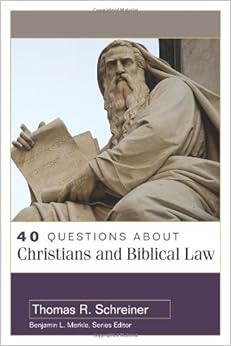Thankfully Thomas Schreiner, New Testament professor at Southern Seminary, is an extremely faithful and trustworthy guide to help interpreters navigate this problem. The book is divided into five parts. The first part deals with the law in the Old Testament. Part two (and the longest part of the book) deals with the law and Paul. Part three deals with the law and the Gospels and Acts. Part four deals with the law in the General epistles. Finally, part five deals with contemporary issues for Christians involving the law.
This book is a treasure trove of wisdom and exegetical insight. Schreiner writes in such an easy to understand tone and covers so much in this book. The book follows a question and response format, where questions like "What is the New Perspective on Paul and how should it be assessed" and "What does the word justify mean" are clearly answered.
I wish I had had this book while I was working on my undergraduate degree in biblical studies. It would have made my research in the area of Paul's thinking on the law so much easier. There is also an excellent annotated bibliography located at the end of the book to help those who are looking forward.
So what can you expect in terms of answers? Schreiner rejects "Covenant theology" and opts instead for "New Covenant Theology" which basically teaches that Christians are no longer under the Old Testament law (yes, that includes the Ten Commandments) but instead are under "the law of Christ." He defends this position quite well and I found him very convincing.
 Are there any weaknesses in the book? The only one that I noticed was that Schreiner doesn't deal very extensively to Matthew 5:17-20 (which, to me, is one of the more difficult texts for the New Covenant Theology perspective). He does devote a chapter to Matthew's view of the law which I think accurately refutes the idea that the law is still binding on Christians. However, I really wish he would have spent more time breaking that particularly text down more.
Are there any weaknesses in the book? The only one that I noticed was that Schreiner doesn't deal very extensively to Matthew 5:17-20 (which, to me, is one of the more difficult texts for the New Covenant Theology perspective). He does devote a chapter to Matthew's view of the law which I think accurately refutes the idea that the law is still binding on Christians. However, I really wish he would have spent more time breaking that particularly text down more.So in conclusion, this book is fantastic. I would highly recommend this work for all pastors. It will help you sort through all sorts of difficulties and clarify the role of the law in the Bible. I would argue that you cannot truly understand the law apart from understanding the role of the law. This work functions as a great aid and guide for students of the Bible.
*Thanks to Kregel Academic for providing a free review copy of this book in exchange for a fair review*
No comments:
Post a Comment